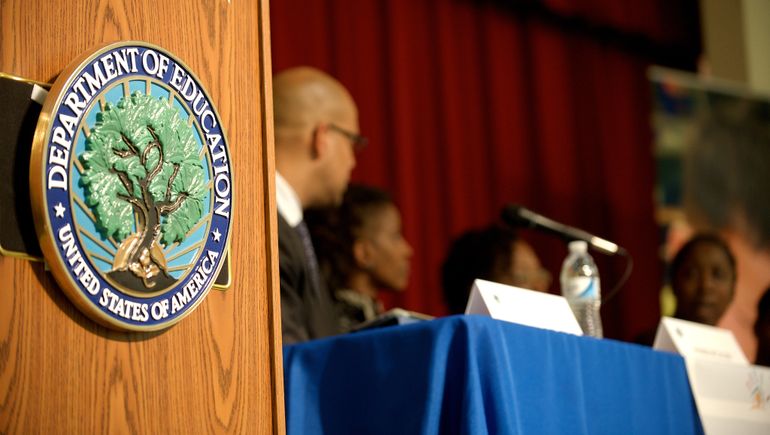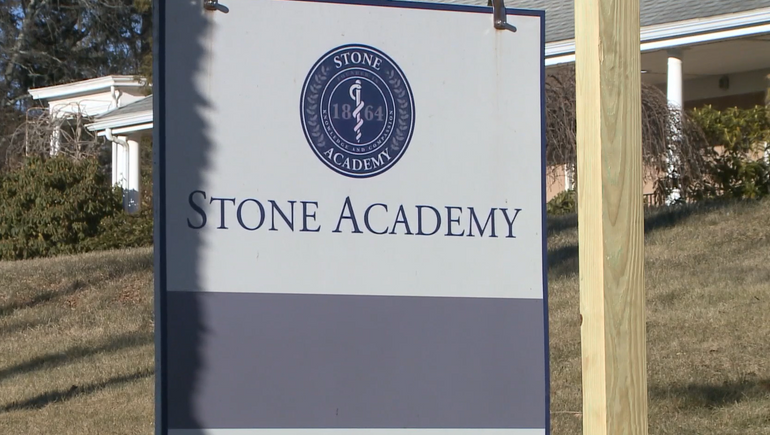[ad_1]
The U.S. Department of Education indicated in its latest regulatory agenda that it will release two long-awaited Title IX rules in March, likely sparking frustration among campus sexual assault prevention and LGBTQ+ advocates after repeated delays.
Education Department officials have twice postponed the two Title IX rules, first aiming to have them out in May 2023, then October.
One rule details how federally funded colleges and K-12 schools would need to investigate and potentially punish sexual violence, while the other would prevent blanket bans on transgender students playing on athletic teams aligned with their identities. The athletics-centered rule would, in some cases, permit institutions to exclude transgender players for reasons like safety or fairness.
After the fall deadline came and went, an Education Department spokesperson said it would “complete this rulemaking process as soon as is practicable,” noting the agency was still parsing the hundreds of thousands of public comments it received. The Education Department must respond to all public feedback before publishing the rules.
These delays did not surprise policy pundits. The current Title IX regulation on sexual abuse reporting, spearheaded by former Education Secretary Betsy DeVos, took nearly two years to come into effect after she introduced the draft version in November 2018.
The Biden administration released its proposal about 18 months ago in June 2022.
The DeVos-era rule mandates that colleges must hold a hearing in response to a sexual misconduct report, in which the accused and accuser can question each other through an adviser or surrogate. It also narrows the scope of cases colleges must investigate.
The Biden administration’s proposal, meanwhile, gives more flexibility to institutions, allowing them to instead tap a single official to investigate and decide a case.
Dozens of House Democrats recently pressed the Education Department in a letter to finish work on the two rules, arguing DeVos’ “weakened protections for sexual assault and harassment survivors and sowed confusion about the extent of students’ protections against sex discrimination.”
“We appreciate the hard work put into updating the draconian Trump-era Title IX rule and other Title IX policies and know the Biden Administration shares our concern for student safety and wellbeing,” they wrote.
The Biden administration’s higher ed agenda
The Biden administration is taking executive action on several other higher education policies as Congress remains strained and gridlocked.
Its agenda, posted Wednesday, also offers a timeline for the executive wing’s other key policy ventures, including a proposed student loan forgiveness program that targets certain borrowers, like those whose balances have swelled beyond their initial principal.
The student loan forgiveness proposal will come in May, according to the Education Department agenda. It is President Joe Biden’s second swing at mass debt relief after the U.S. Supreme Court in June struck down his initial plan that would have wiped away up to $20,000 for some borrowers.
The Education Department is pursuing the debt cancellation through a regulatory tactic known as negotiated rulemaking, which brings in groups who would be affected by policy changes to find common ground.
If the panel finds complete consensus on provisions for the new rule, the department will adopt its language. Otherwise, the agency can write its own regulations.
The agency has already determined which sets of borrowers could receive relief — for example, those who entered repayment on loans decades ago.
Further, the Education Department disclosed for the first time it will attempt rulemaking on federal statute that requires colleges to report foreign gifts and contracts worth $250,000 or more. It plans to publish a regulatory plan on that law, Section 117 of the Higher Education Act, in June.
Conservatives have taken interest in Section 117, accusing colleges of evading the law and not sharing the complete scope of their foreign donations.
The Trump administration elevated the law from an obscure statute to a political rallying point. Under DeVos, the Education Department alleged colleges failed to report billions of dollars in foreign money and tied compliance with the law to continued receipt of federal financial aid.
As political tensions escalated with countries like China, Republicans’ criticism on the matter intensified. House Republicans recently introduced the Deterrent Act, which would lower the Section 117 reporting threshold to $50,000 and block gifts from “countries of concern,” including China, without permission from the Education Department.
The American Council on Education, higher ed’s top lobby, opposes the Deterrent Act, which passed the House on Wednesday in a 246-170 vote. It likely faces an uphill battle in the Democrat-controlled Senate.
ACE has repeatedly asked the Education Department to conduct negotiated rulemaking on Section 117.
[ad_2]
Source link









